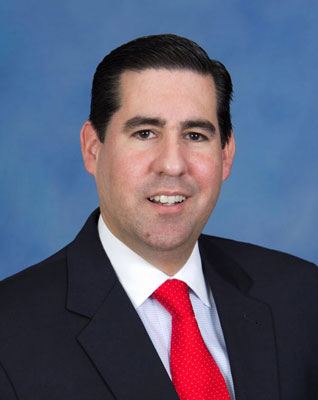Citing controversial Texas Supreme Court decision, Pharr refuses to release city manager’s salary
Pharr wants to keep City Manager Alex Meade’s salary a secret.
Alejandro “Alex” Meade III, 42, of Mission accepted the job — which typically comes with a six-figure salary — in November.
 Meade previously managed the Mission Economic Development Corp., which paid him more than $195,000 annually, according to records released under the Texas Public Information Act. Pharr, however, wants to keep Meade’s new salary a secret.
Meade previously managed the Mission Economic Development Corp., which paid him more than $195,000 annually, according to records released under the Texas Public Information Act. Pharr, however, wants to keep Meade’s new salary a secret.
“I certainly think that’s very bad public policy to allow such key public information to be withheld: how much taxpayers are paying for their public employees,” said Jim Hemphill, an Austin-based attorney who serves on the Freedom of Information Foundation of Texas board.
Asked whether or not Pharr residents had a right to know Meade’s salary, members of the City Commission differed.
“People should know,” said City Commissioner Mario A. Bracamontes. “Especially the city of Pharr should know.”
Meade is an excellent city manager, Bracamontes said, and Pharr residents deserve to know the cost of employing a top-notch administrator.
“I think every other city manager we’ve had, we’ve been able to release the contracts and salaries for them,” Bracamontes said. “So I think we should.”
City Commissioner Roberto “Bobby” Carrillo disagreed.
Recruiting a top-notch city manager is difficult, Carrillo said, adding that making the contract and salary information public could place Pharr at a competitive disadvantage.
“Unfortunately, it’s like a bidding war around here with the different cities,” Carrillo said, adding later: “I think, eventually, we will probably release it. But I think right now is just a delicate time.”
The Progress Times requested Meade’s contract and personnel records on Dec. 10.
City Attorney Patricia A. Rigney refused to release the salary records and requested a ruling from the Texas Attorney General’s Office.
“The City competes with other cities in attracting businesses, economically, and in attracting City leadership with certain skills at a competitive rate,” according to the letter Pharr sent to the Attorney General’s Office on Dec. 18. “The City has not made the contract public. The release of this information would cause harm to the City of Pharr’s interest in retaining a qualified, experienced, City Manager at competitive rates and in turn harm the City’s ability to compete with other cities in hiring a City Manager.”
To support that argument, Pharr cited the controversial Texas Supreme Court decision in Boeing v. Paxton.
The Public Information Act includes an exception for “information that, if released, would give advantage to a competitor or bidder.” In Boeing v. Paxton, though, the Supreme Court determined the exception meant “an advantage, not whether it would be a decisive advantage.”
Armed with the decision, businesses and local governments across Texas started withholding a wide array of records from the public.
Perhaps most infamously, the city of McAllen hired pop star Enrique Iglesias to perform at the December 2015 holiday parade — and refused to tell taxpayers, who paid for the concert, how much Iglesias made.
“The problem with the Boeing ruling is it’s nebulous in the sense that if read in a certain manner, virtually anything can be withheld from the public,” said state Rep. Terry Canales, D-Edinburg. “And, obviously, that cannot be the goal of Boeing. If completely eliminating transparency and the public’s right to know was the goal, then the Public Information Act would have been nixed altogether.”
Canales authored a bill to close the loophole for parades and concerts during 2017, but the legislation died in the Texas Senate.
State Sen. Juan “Chuy” Hinojosa, D-McAllen, said he had similar concerns about Boeing v. Paxton.
“I disagree with that decision. I think they’re wrong,” Hinojosa said, referring to the Supreme Court. “The public has a right to know. It’s taxpayers’ money.”
McAllen, Edinburg and Mission regularly release employee salary data. Pharr also released salary data for years, including salary information for former City Manager Juan Guerra and former City Manager Fred Sandoval.
If the Attorney General’s Office allows Pharr to keep Meade’s salary a secret, cities and school districts across Texas may start making similar arguments.
Pharr didn’t take the decision to withhold Meade’s contract and salary information lightly, said Carrillo, the city commissioner.
“It’s like finding the right quarterback for your team. You have a lot of good quarterbacks out there, but not everybody makes it to the Super Bowl. You’ve got to find the right mix for your team,” Carrillo said. “And I think when we found Mr. Meade, he fits right into the team that we’ve formulated.’
Transparency is a top priority in Pharr, Carrillo said, adding that the city posts meeting agendas, financial records and other documents online. Pharr also publishes videos from City Commission meetings, the Planning and Zoning Commission, and various advisory boards.
“There are just some things we have to do to try to protect our own city,” Carrillo said.
Access to public records is a non-partisan issue, said Houston-based attorney Joe Larsen, who serves on the Freedom of Information Foundation of Texas board.
“It’s non-partisan. But it’s damn sure political,” Larsen said. “The politicians have to be judged not by the rhetoric they use but by their actual actions on government transparency.”





